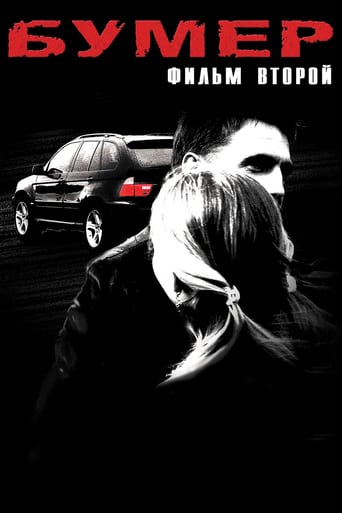Tgrain
Sequels are always a dilemma for directors, it's very easy to miss and Buslov gets a lot of credit for moving straight into a sequel as his next feature project.Instead of returning to the same old story twice, Buslov wisely chose to make the story about redemption and effectively introduced a new lead in the form of Dasha, a girl that seems fated to repeat the footsteps of Kostya's gang and played masterfully by Svetlana Ustinova. The story is sufficiently realistic, though he takes a few more chances than with the original there are no holes or dilemmas that would irritate. Casting is very high caliber and the music doesn't fail to deliver again. Cinematographically Buslov evolved to a slightly faster paced style, there is less moving camera than with the original Boomer (something I personally enjoyed), but close ups are very effectively utilized. On the other end, one or two sequences are overextended time wise, but not to the point of irritation. Note: unlike with the Brother films of Balabanov, it does help to see Boomer 1 prior to watching this film.
k1001bg
====minor spoilers ahead====*I apologize for the length of this review, but reading so many inadequate comments on this movie provoked me to be a bit more verboseSwimming against the current is pretty much what Pyotr Buslov does with his second Bumer movie. It makes it twice more admirable that he does it against the current he himself helped create.Beginning from Brother (1997), the Russian cinema produced a myriad of gangster flicks, which contained great amount of gore and blood, several memorable anti-heroes, and ultimately very little criticism of a reality so fundamentally flawed, that to a westerner's eye it appeared as cartoonish and unrealistic, as say the reality presented in Bekmambetov's Nightwatch universe.Bumer (2003) was different, but too few people realized it. It had plenty a shiny metal, guns, girls and blood to mask itself well. But to a careful eye, it somehow didn't match. To begin with, the gangsters were running away, they were being hunted and endangered, but not by other gangsters, or crooked politicians or even ex-KGB agents, but by the same marginal characters that so often appear to be the victims in contemporary Russian cinema - truck drivers, drunk cops, villagers. In fact at one point even an old babushka managed to scare them. Contrary to the established existential model in which a gangster starts out small and poor and struggles to the top of the food chain with all means possible, in his first movie Buslov did something completely different. As the four friends were running away, the world itself became rougher and darker, up to the point when it consumed them all, together with the BMW.While the first film relied on certain quantity of raw violence to attract attention, the second conveys Buslov's real message in a much more artistic way.All begins with a flashback of the first movie's ending. Fast forward four years. Two of the four are dead, who they were matters no more to those who survived. Notably the introduction remains the most violent scene in the whole movie. From then on lyricism slowly begins to take over from the violence as Buslov's main expressive tool. Kostya is getting released from prison but his past is done. There is no vengeance , no scores to settle. There is no empire to build. Vladimir Vdovichenkov pulls out another awesome performance as the wandering Kostya. Already vanishing in the first movie, the cocky, violent thug has now completely disappeared, and instead an ordinary man who's accepted the loss of all and simply wants to live the rest of his days on his own, away from everything has emerged. But along comes Dasha, a teenage criminal with a plan and at one point the journey ahead somehow becomes too easy. Drive far enough, buy tickets, reach paradise. But Kostya can't go to paradise. He's too old, he's seen and done too much. They don't let people like him in paradise. It is this realization that ultimately helps Kostya make a decision that redeems him and lets him find his own "paradise on earth".Early in the movie Dimon makes a very interesting statement. The times are changing, says he to Kostya, but we learn very quickly that under the surface, this is not the case. Some things can never change. Thus, trying to change things in general might not be what is essential. Instead, changing one person might be all it takes."I'm uncertain of what I'd have done in your place then" says Kot to Dimon at one point, but at the end he knows. I read someone complain of the sad ending. The concept of the movie would have not have worked without it.Despite what she does, Dasha is still a child, an Buslov tries very hard to make this point. There are no sex or nude scenes (in fact not even a kiss) with her in the movie. While Kostya's life is pretty much over at the beginning of the movie ("Tell your children to live better lives than we did" says he to Dimon), for her there is still a chance somewhere else. Ensuring she gets that chance becomes Kostya's chance and his decision at the end ultimately makes the difference between the two Bumer movies and much of the rest of what is produced cinematically in Russia today. Apart from the great story all work done on the movie is superb. The cinematography is simply amazing, with plenty a carefully situated and crafted shots, as intricate and subtle as in some of the most visually brilliant recent western movies. In fact some centerfold scenes were so skillfully made that in a weird way they reminded me of "Lost in Translation". As always Sergei Shnurov does his business flawlessly and the score is more than appropriate, with several exceptional songs, including "Svoboda" ("Freedom") with samples of Kipelov's "Ya Svoboden" ("I'm Free") which breaks through half-way through the movie and pretty much synthesizes the spirit it was created with. In the end Bumer 2 makes for a moving and highly artistic movie, much more in the fashion of "The Return" than of "Brother". For this, all of us who consider cinema, Russian and world, to be more than guns and gore, can only be thankful.
dellarocco
Do not expect this movie to be similar to the first "Bumer". Coz it is not. You better try to think of it as the one trying to become more mature, like a teenager trying to grow up. I guess it did. Though, with doing so, by becoming "smarter", it also became somewhat boring. It felt like the movie lacks some rhythm, some drive, which made the first one the classics of its genre. I'm not saying Bumer 2 was bad, because it wasn't. It was just…I don't know…weak? Unshaped? Misguided? Actors weren't pathetic, but it certainly wasn't enough. The plot was OK, but it lacked sense. Some important thoughts were brought up, but the development of those was totally lacking. Sad enough, but the four mobsters on their BMW made a far greater impact...
dullsenkurz
First, i must say that I really enjoyed watching the Bumer. It was an interesting and original experience of Russian cinema. In short, it's one of the best movies from Russia I have ever seen (the other one for me could be 9-ya rota so far). Therefore I went to cinema with high expectations. After watching this flick of Buslov there was not a frustration, but i realized that sequel did not manage to achieve the superb level of its predecessor. More or less this was completely another kind of story. Of course, there is a strong connection with events of the first film, though you are free to watch it even if you have not seen the first Bumer. It's not a flawless movie. There were several short disturbing ''black breaks'', which made Bumer: Film vtoroy a bit spotty. Also this made the plot scattered. One excellent thing about this is soundtrack. It's truly outstanding. With scenes of todays Russia, witty dialogs, tragicomic story - it is a good movie and a must-see for fans of Bumer, although some of them may be disappointed.


